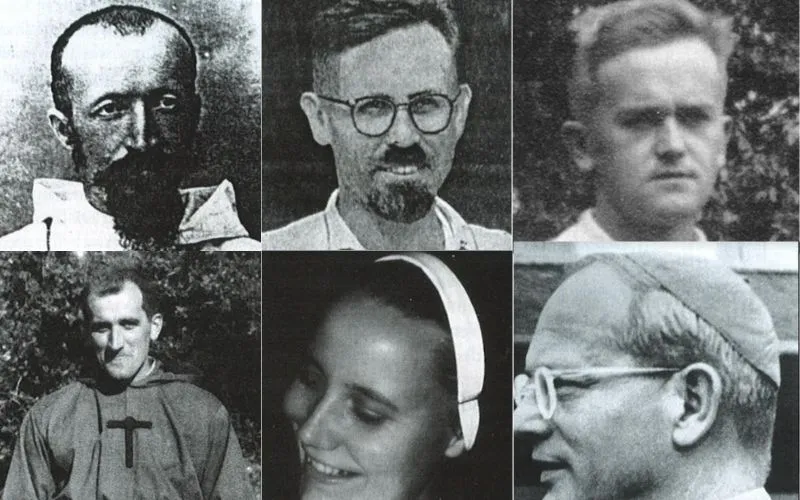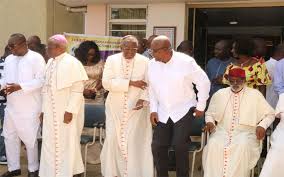Catholic Bishops in Germany have compiled biographies of over 30 German “martyrs”, who were reportedly “victims of violence in Africa” to ensure that their testimonies are not lost.
In a note he sent to our Correspondent, Mons. Helmut Moll, the representative of the German Catholic Bishops’ Conference for the Martyrology of the 20th Century, said that the list includes missionaries who died in violent uprisings and political unrests in African communities
“I would like to draw your attention to Christian missionaries as victims of violence in Africa who were violently killed in the last century and who should be saved from oblivion,” Mons. Moll said.
Bishop Adolph Schmitt in Rhodesia 1976
He added that the publication of testimonies of the German martyrs, who played a significant role in evangelizing the continent would go a long way in “rescuing” the Christian victims of violence associated with Africa “from oblivion.”
The German martyrs whose profiles have been documented include Fr. Franz Jäger, a member of the Oblates, who was killed in 1905 in South West Africa during the Herero uprising. South West Africa was a territory under South African administration from 1915 to 1990; it became the present-day Namibia.
Others are the three Dominican missionaries, who lost their lives in Rhodesia (present-day Zimbabwe) in 1977. They include Sr. Magdala (Christa Elisabeth) Lewandowski from Kiel, Sr. Epiphany (Berta) Schneider from Munich, and Sr. Ceslaus (Anna) Stiegler from the Upper Palatinate.
Bruder Heinz vom Kreuz (Heinz) Eberlein
For decades now, the documentation of German martyrs has found its inspiration in the November 1994 Apostolic Letter of Pope John Paul II on the preparation for the Jubilee of the Year 2000, Tertio Millennio Adveniente.
In the Apostolic Letter, Pope John Paul II said, “At the end of the second millennium, the Church has once again become the Church of martyrs. In our century, martyrs have returned, often unknown, akin to ‘unknown soldiers’ of the great cause of God.”German Martyrs
Groundbreaking Biographies of “German martyrs”, Who Were “violently killed” in Africa
Read the article
John Paul II emphasized the need to preserve the testimonies of the martyrs who he said had held on to their faith during the persecutions of the 20th century and urged local churches to ensure that the memory of those who have suffered martyrdom is not lost by creating the necessary documentation.
Following the 10 November 1994 Apostolic Letter of Pope John Paul II, the Catholic Archbishop of Cologne in Germany, Joachim Cardinal Meisner, initiated the project to collect testimonies of martyrdom.
Bischof Cassian (Franz Anton) Spiß
The German Bishops’ Conference entrusted Mons. Moll, a historian with prior experience working in the Vatican Congregation for the Doctrine of the Faith with the task. Mons. Moll also had prior involvement in the Vatican Congregation for the Causes of Saints
The first edition of the Martyrology was presented to Pope John Paul II on 18 November 1999, by Mons. Moll and Karl Cardinal Lehman, the then-president of the German Catholic Bishops’ Conference.
A second edition came in 2000, followed by the third edition in 2001, the fourth in 2006, the fifth in 2010, the sixth in 2015, and the seventh in 2019.
Bruder Bernhard Ignatius Sarnes
Currently, the Martyrology features nearly 1000 images of men and women who suffered and died for their faith.
Here is the list of martyrs of German descent who were martyred in various African countries
Missionaries killed in Tanzania
Sr. Avia Marschner from Schirgiswalde (Saxony), a missionary in Tanzania who died on September 15, 1905, in Darussalam in Tanzania.
During the popular Maji Maji uprising in Tanzania, the following Benedictine missionaries and St. Benedictus Missionary Sisters of St. Ottilien were violently killed in 1905: Bishop Cassian (Franz Anton) Spiß from Austria, Sr. M. Cordula (Regina) Ebert from Lower Franconia, Sr. M. Felicitas (Elisabeth) Hiltner from Bornholte, Br. Andreas (Hubert Hilarius) Scholzen from the Eifel, Br. Gabriel (Alois) Sonntag from Swabia, Sr. M. Walburga (Josefa) Diepolder, also from Swabia, and Fr. Franziskus (Karl) Leuthner from Baden.
Missionary killed in Namibia
Fr. Franz Jäger, an Oblate born in Eichsfeld in 1875, and killed in 1905 in South West Africa (Namibia) during the Herero uprising together with Christians of the Protestant denomination.
Pater Karl Maria Weber
Missionaries killed in Congo
In the course of the political unrest in the Congo (present-day Democratic Republic of Congo) in the 1960s, the Sacred Heart Missionary Fr. Karl Maria Weber from Lower Bavaria was killed.
In 1964, the two Little Brothers of Charles de Foucauld, Bernhard Ignatius Sarnes from Upper Silesia and Heinz Eberlein from the Siegerland region, lost their lives together with Protestant Christians.
Dominican, Jesuit, and Mariannhill missionaries killed in Zimbabwe
Three Dominican missionaries lost their lives in Rhodesia (present-day Zimbabwe) in 1977: Sr. Magdala (Christa Elisabeth) Lewandowski from Kiel, Sr. Epiphany (Berta) Schneider from Munich, and Sr. Celsius (Anna) Stiegler from the Upper Palatinate
Sr. Magdala (Christa Elisabeth) Lewandowski
Still, in Zimbabwe, three Jesuits died in 1977 due to the wave of political persecution: Br. Bernhard Lisson from Upper Silesia, Fr. Gregor Richert from Berlin-St. Adalbert, and Fr. Gerhard Pieper from Berlin-Wedding-St. Peter.
The following Mariannhill missionaries suffered martyrdom in Zimbabwe between 1976 and 1988: Sr. Francis (Elsbeth) van den Berg from the Bergisches Land, Bishop Adolph (Gregor) Schmitt from Würzburg, Fr. Possenti (Anton) Weggartner from Lower Bavaria, the Nuremberg missionary doctor Dr. Johanna Decker, Br. Peter (Edmund) Geyermann from the Moselle, Fr. Edmar (Georg) Sommerreiser from Schwaben, Br. Kilian (Valentin) Knörl from Heroldsberg in Upper Franconia, and Sr. Ferdinanda Ploner from Carinthia.
In the note that Monsignor Moll shared with ACI Africa and made available to RECONA, he said that the biographies of the German martyrs in Africa are currently being translated into Arabic.
- RECOWA-CERAO WELCOMES TWO NEW BISHOPS - July 26, 2024
- TODAY WE ARE TAKING UP THE THIRD SEGMENT IN OUR SERIES - July 26, 2024
- CHARACTERISTICS OF GREAT LEADERS SHARED BY A USA AUTHOR - July 25, 2024







